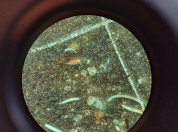Search
Filter by
Type
Tags
Dossiers
Themes
Departments
Active filters
1032 search results
Search results
-
Eiko Kuramae's inaugural lecture
Op dinsdag 11 april houdt Eiko Kuramae haar oratie als hoogleraar Microbial Community Ecology & Environmental Genomics in Utrecht
-
Expedition to uncover invisible life in Galápagos
An international research team led by the Netherlands Institute of Ecology (NIOO-KNAW) is to search for invisible life in the Galápagos Islands. -
Galapagos (Scalesia) Microbiome Project
How unique and diverse is the invisible microbial life associated with the endemic Scalesia species of the Galápagos Islands? -
LTSER-platform Veluwe
The area defined as ‘the Veluwe’ lies in the province of Gelderland, the Netherlands, West of the river IJssel and North of the river Rhine. The region hosts the largest connected nature area of the country. The natural landscape consists of a mix of forests, heathlands, sand drifts, lakes, and moorlands and is surrounded by agriculture, settlements, or infrastructure. This means there is a lot of interaction between humans and nature.
-
Sam Bielen
PhD Candidate -
Forest soil boost for iconic Dutch national park
A major NIOO-supervised experiment is underway in one of the Netherlands most iconic nature areas, with a key role for the soil. -
Britt van Zelst
PhD Candidate
-
Developing digital twins to help understand ecosystems
LTER-LIFE aims to study and predict how global change affects ecosystems. It is one of nine projects that have just won funding for setting up and improving large-scale research infrastructure.
-
Soil biodiversity analysis for sustainable production systems (SoilProS)
SoilProS will interpret big data on soil biodiversity, soil chemical and physical characteristics with respect to current and desired soil functions, and how to use this information in order to help farmers predicting which crop varieties, seed mixtures, (organic) fertilizers, soil inocula, and organic substrates enhance the environmental sustainability of their activities.
-
Partner organisations global comparison soil transplantation
Partner organisaties vergelijking bodemtransplantatie
